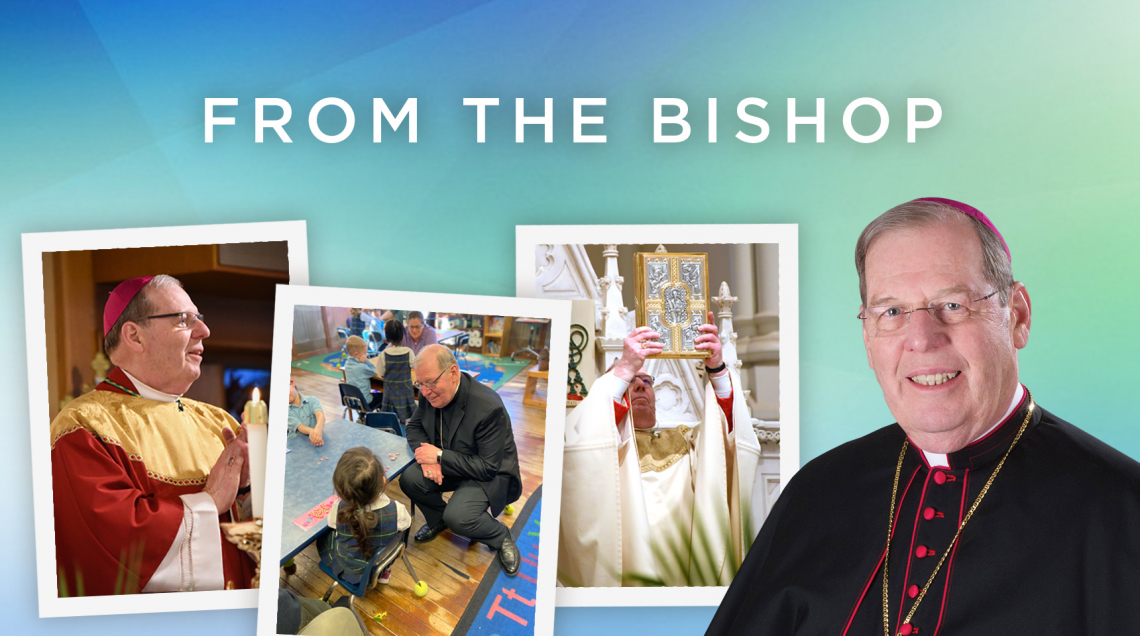From the Bishop - March 2023

During January, a new part of Pope Francis’ Synod on Synodality unfolded. The focus of the synod, you will recall, is a process of reflection on communion, participation, and mission in the Church. A summary of the comments of the thousands of people who offered reflections during the first phase of the synod was circulated. Now it is time for a further reflection before the first session of the actual synod meeting takes place in Rome in October. This phase is called the Continental Phase. For us, here in the Diocese of Portland, that meant that we were joined with representatives from the dioceses of the United States and Canada. Each diocese was represented by its bishop and five people named for that task. The online gathering discussed questions in an atmosphere of inquiry and hope. It was similar to the earlier consultations that had taken place throughout our diocese and our country both in person and online.
We are grateful for the participation of all who have joined in this effort. We pray it will strengthen us in our mission to bring the good news of the Gospel into our communities. In fact, as I talk to people involved in the synod, it is the feeling that the true gift of this synodal process is in the doing, in the praying together, and in learning to listen to the guidance of the Holy Spirit.
In thinking, then, about the synod and its mission of helping the Church grow in journeying together, we should not lose sight of the fact that we already have good examples of synodality in the Diocese of Portland that enhance our communion and our journeying together as Church. In the parish, this would include parish pastoral and finance councils, and for the diocese, we would mention the Diocesan Pastoral Council, Presbyteral Council, and Diocesan Finance Council. All of these bodies allow for mutual listening to the call of the Holy Spirit and allow for the bishop or the pastor to make decisions based on praying together and listening to one another.
In that regard, I want to share with you an important recent development. Our diocese undertook a revision of our Parish Pastoral Council Policies and Norms, an instrument that helps parishes support well-functioning pastoral councils which assist the pastor in coordinating programs and activities that address the needs of parishioners and further the Gospel. The initiative aimed to lay out the best ways for our laypeople of all ages who comprise the councils to best echo the voices of the wider parish to the pastor and help him in discerning the pastoral needs of the community. The parish pastoral councils are pastoral in the sense that their purpose is to assist in the development of an overall mission plan for the parish that makes Christ ever present. Parish pastoral councils do not govern but, rather, study and recommend approaches to effective evangelization and catechesis. The process to assemble a document that would successfully accomplish that mission was a valuable example of synodality at both the diocesan and parish levels.
Many stages of document review and revision occurred before the policies and norms reached my desk. I am very grateful for the work of the Diocesan Pastoral Council in coordinating this effort. This council, composed of laypeople from around the state, worked together on this document. They began by taking the original policies and worked to improve them so that they would help parish pastoral council members in their service to the parish and its mission. The redrafted version was presented to the Diocesan Presbyteral Council for additional guidance coming out of the experiences of the priests and pastors who are its members. Through this collaborative, participatory process, guided by prayer, dialogue, and cooperation, a practical and useful document emerged.
When the new Parish Pastoral Council Policies and Norms document was finalized, the Diocesan Pastoral Council conducted workshops in our six vicariates for clergy and lay representatives from almost all our parishes. The presentations instructed participants on how these councils should be put into effect in a way in which, together, we can better bring the Gospel to life in our communities. As Mary Colombo, chair of the Diocesan Pastoral Council said, the entire process “was truly a joint effort.” The feedback received from those participating was overwhelmingly positive. One comment described the material as “very helpful in clarifying the role of the parish pastoral council,” while another added that the new document offered “much needed direction.”
The guidelines, the process followed to form them, their presentation to parish representatives, and their execution in our parishes are examples of synodality, a word that means “shared journey.” Many people worked together to improve the way we are sharing the Gospel by seeking the best ways for that to come about.
Together, we listened carefully to each other to discern where the Holy Spirit was leading us. That is our responsibility as members of the Catholic Church: to listen with humility. It is a responsibility but also a grace. Listening and sharing our journey helps each of us, with the guidance of the Holy Spirit, to find hope and deepen our faith as we strengthen our parish communities.
May your Lent be a time of renewal in an appreciation of the gift of faith.
God bless you all.










